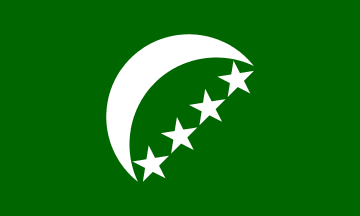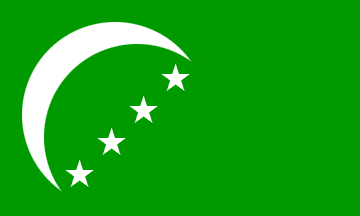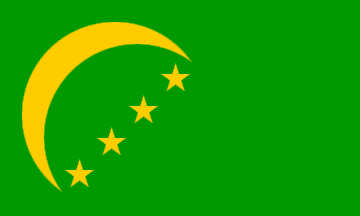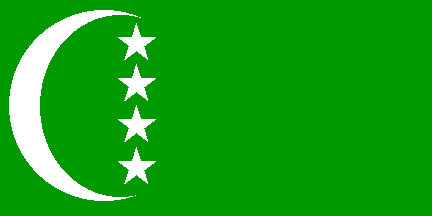 image by Jorge Candeias, 02 Aug 2005
image by Jorge Candeias, 02 Aug 2005
Last modified: 2016-03-10 by bruce berry
Keywords: comoros |
Links: FOTW homepage |
search |
disclaimer and copyright |
write us |
mirrors
 image by Jorge Candeias, 02 Aug 2005
image by Jorge Candeias, 02 Aug 2005
See also:
Following a coup d’etat on 13 May 1978, led by mercenary Bob Denard,
President Abdallah was returned to power. The flag of Comoros was
officially changed on 23 May 1978.
Jaume Ollé, 30 Mar 1997
According to an article in The Flag Bulletin (No. 174)
[tfb], in 1978 the field of the flag became
green (like the flag used between 1963-1975). Crescent
moon was enlarged and still faced towards bottom right but the stars were now arranged in a
line between its horns.
Stuart Notholt, 22 May 1997
On 13 May 1978, the French mercenary Robert “Bob” Denard (a.k.a.
“Colonel Mustafa Madzihu”) overthrew President Soilih and Abdallah
was re-established as President. The new Constitution, dated 01 October 1978, prescribed the
Federal and Islamic Republic of Comoros. According to Pierre Charles Lux-Wurm
in
Les drapeaux de l’Islam de Mahomet à nos jours
[lux01], red was
removed from the new flag, and the four stars were placed between the two
points of the crescent symbolizing reconciliation.
Ivan Sache, 20 Apr 2002
Following an invasion by mercenaries in which President Ali Soilih
was killed, a former president, Ahmed Abdallah, was restored to power. The
country was proclaimed an Islamic republic and a new flag was
adopted. There appears to be uncertainty about both the shade of
green and the proportions of this flag. Whitney Smith in Flags and Arms
across the World (1980) [smi80] (a work in which
colour shades are not very reliable) shows a dark green and states that
the proportions are approximately 3:5. William Crampton in The
World of Flags (1990) [cra90] also
shows the field as being dark green. The
proportions are not stated but
the illustration is 1:2. Later in The Observers Book of
Flags (1991) [cra91], Crampton
shows a shade of green that is only slightly darker than normal with the proportions
of the illustration being 3:5. Carol Shaw in Collins Gems Flags (1994)
[shw94], which uses illustrations
prepared by the Flag Institute, has a medium green;
proportions are not specified but the illustration is 3:5.
Vincent Morley, 29 Mar 1997
Lux-Wurm [lux01] gives the proportions as
2:3, while Hervé Calvarin in
Comores: un nouveau drapeau pour la réintégration d’Anjouan [clv02] says
the proportions were 3:5.
Ivan Sache, 20 Apr 2002
At the Comores
InfosWeb site, the flag seems as being that used between 1978-1992.
Horváth Zoltán, 27 Jan 2002
Strange indeed. I would propose the theory that this is an archival
photo, used in lack of a more recent one (a phenomenon which often causes
erroneous vexillological reports).
António Martins, 30 Jan 2002
I have on my files a photo of the
1998-1999 prime-minister of Comoros Djoussouf Abbas in front of a flag.
It’s a green flag with the crescent and four stars of Comoros tilted
45° clockwise. The fact that this flag appears in this photo means, I
believe, that the flag didn’t die with its
replacement in 1992. I don’t know when this
photo was taken, but I suspect that it might have been sometime during the
flag debate that took place in the country and led to the adoption of the
current flag. Why? Well, because of the details in
Abbas’ political carreer: In this
biography
of him (in French) we find that he was a candidate for president in 1990,
coming 4th. Then, since he was born in 1942, he’d be 48 yeas old,
and I believe he looks a lot older than that in the photo. And the
next time we could expect to find him in front of a Comorian flag
is 1996, when he came 2nd in that year’s presidential elections.
That’s 4 years after the flag changed. I think that it is possible
that this flag kept on living somehow beyond 1992.
Jorge Candeias, 02 Aug 2005
 image by António Martins, 30 May 2008
image by António Martins, 30 May 2008
Four 1985 stamps issued to celebrate the 10th anniversary of independence
have
identical images (painting of a flag flying in front of the sun with map
outline of the four islands) with different colour backgrounds for different
face values — FotW stamps
#00022 (10F, dark blue),
#02883 (125F, pink),
#02882 (15F, grey), and
#02884 (300F, pale blue).
These stamps show a ~3:5 medium green flag with large white crescent
pointing to the lower fly (with white 4 stars) offset to the hoist.
António Martins, 06 and 11 Jun 2009
These stamps were issued as a set of four in 1985 to commemorate the 10th
anniversary of Comoros’ independence:
The flag is shown is green, with a crescent moon (with its curved edge
towards the hoist) and four stars in white arranged in a line
between the horns. The bottom horn of the crescent is just inside the lower
hoist corner of the flag, while (I estimate) the top horn is just inside the
middle of the top edge of the flag. The top point of each of the four stars
lies on the line between the horns.
Richard Mallett, 03 Dec 2005
 image by António Martins, 12 Jun 2008
image by António Martins, 12 Jun 2008
The Comoros flag pictured on this stamp
(part of a stamp set issued in 1985; the Stanley Gibbons catalogue
numbers are 562 to 565) is pale green, with a golden crescent set at an angle
together with five small golden five-pointed stars set between
the points of the crescent.
Ron Lahav, 02 Feb 2005
There seems to be a discrepancy in the colours of the stars between the
2005 edition of Staney Gibbons Stamps of the World which I used and
the 2006 edition which other people are using.
Ron Lahav, 04 Dec 2005
 image by Ivan Sache, 20 Apr 2002
image by Ivan Sache, 20 Apr 2002
A series of five stamps originally issued in 1981 shows a flat
depiction of a ~1:2 green flag with a large white crescent pointing to
the fly (with white 4 stars) offset to the hoist; FotW stamps
#02886 (15F, yellow),
#02887 (25F, pink),
#02888 (35F, golden brown),
#02885 (5F, reddish brown), and
#02889 (75F, blue). Its
erroneousness compared with the contemporary national
flag is clear, it being depicted flat.
António Martins, 06 Jun 2008
Calvarin [clv02] reports an unofficial
(or simply erroneous) version of this flag, shown on a
Comorian stamp. The
flag is 1:2 with a large crescent placed along the hoist and the four stars
placed vertically between the points of the crescent.
Ivan Sache, 20 Apr 2002
The stamp
reported by Ivan Sache from [clv02]
was indeed issued in 1985 (FotW stamp #02890),
but as the sixth (also 75f, but light green) of the 1981 series,
not the same design as the new series released also in 1985, with
tilted offset crescent.
António Martins, 06 Jun 2008